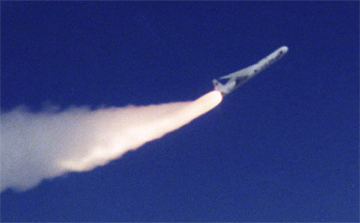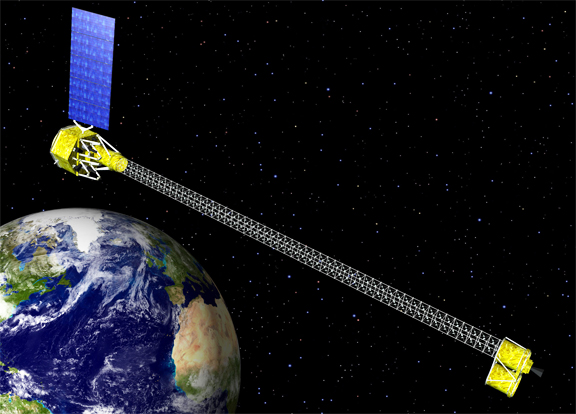
Orbital's L1011 and Pegasus rocket,
photo courtesy of Orbital Science.
...NASA’s Nuclear Spectroscopic Telescope Array (NuSTAR) satellite, has arrived at its launch site in the mid-Pacific Ocean. Following a 4,200 nautical mile ferry flight that included a refueling stop at Hickam Air Force Base in Hawaii, Orbital’s “Stargazer” L-1011 carrier aircraft arrived at the Reagan Test Site airfield on Kwajalein Atoll in the Marshall Islands, where the NuSTAR launch will originate. The launch is currently scheduled for June 13th at approximately 11:30 a.m. (EDT), subject to final pre-launch testing and acceptable weather conditions at the time of launch.

Orbital's Pegasus rocket in flight, photo courtesy of Orbital Sciences.
The NuSTAR satellite project is led by Dr. Fiona Harrison, the mission’s Principal Investigator from the California Institute of Technology (Caltech). It is part of NASA’s Small Explorer (SMEX) series that is managed by the Goddard Space Flight Center for NASA’s Science Mission Directorate. These low-cost, highly effective small satellite missions have enabled scientists to gather critical data about the Earth’s environment, the solar system and beyond. In addition to Caltech, NASA’s Jet Propulsion Laboratory (JPL) is one of Orbital’s key mission partners on the NuSTAR project.

Artistic rendition of NASA's NuSTAR satellite.
Pegasus is the world’s leading launch system for the deployment of small satellites into low-Earth orbit. Its patented air-launch system, in which the rocket is launched from beneath Orbital’s “Stargazer” L-1011 carrier aircraft over the ocean, reduces cost and provides customers with unparalleled flexibility to operate from virtually anywhere on Earth with minimal ground support requirements. The NuSTAR launch from Kwajalein is an example of its unrivaled mission versatility. The launch of the NuSTAR satellite will be the 41st Pegasus mission since its introduction in 1990. It remains the world’s only small space launch vehicle that is certified with NASA’s Payload Risk Category 3, which the space agency reserves for its highest value space missions.

